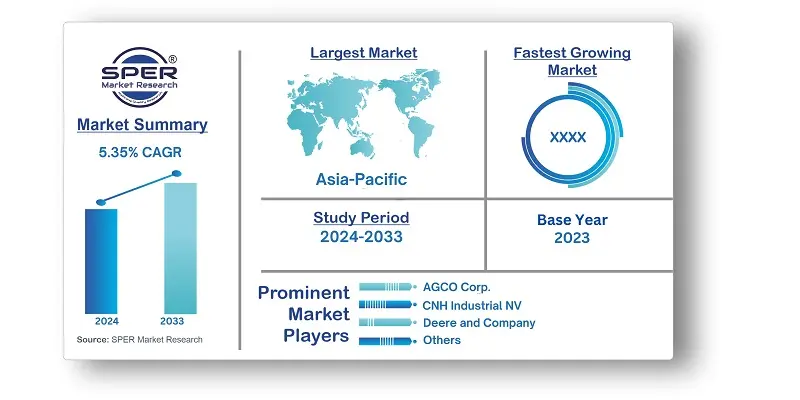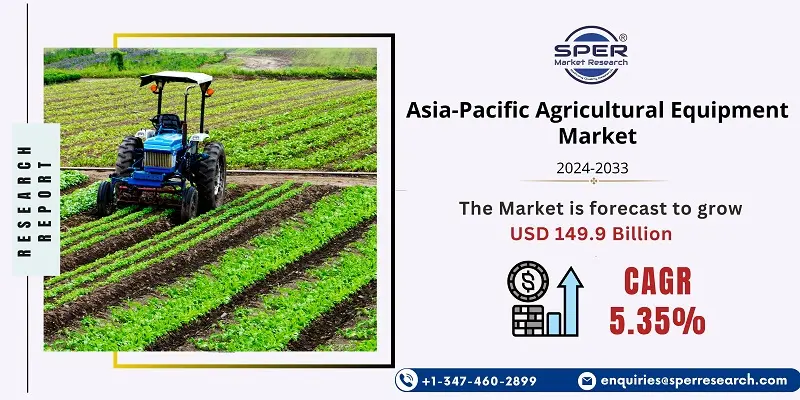
Asia-Pacific Agricultural Equipment Market Growth, Size, Trends, Revenue and Future Outlook
Asia-Pacific Agricultural Equipment Market Size- By Product Type- Regional Outlook, Competitive Strategies and Segment Forecast to 2033
| Published: Jul-2024 | Report ID: AGRI2428 | Pages: 1 - 157 | Formats*: |
| Category : Agriculture | |||
- November 2022: At the CII Agro Tech India 2022 show, VST Tillers Tractors Ltd. and ZETOR TRACTORS announced the introduction of two new tractors. They state that VST & Zetor created these two new tractors, with 45 and 50 horsepower, at their facilities in the Czech Republic and India.
- September 2022: At the 7th EIMA Agrimach Expo in Bengaluru, New Holland Agriculture, a trademark of CNH Industrial, announced the introduction of the Blue Series SIMBA and its entry into the sub-30 HP compact tractor category in India. A new addition to the company's Blue Series lineup, the tractor is meant for specialized uses including rotavating, spraying, and inter-row cultivation in cotton fields, vineyards, orchards, and sugarcane fields, among other places.


| Report Metric | Details |
| Market size available for years | 2020-2033 |
| Base year considered | 2023 |
| Forecast period | 2024-2033 |
| Segments covered | By Product Type |
| Regions covered | Australia, China, India, Japan, South Korea, Rest of Asia-Pacific |
| Companies Covered | AGCO Corp., AMAZONEN-Werke H. Dreyer GmbH & Company KG, CNH Industrial NV, Deere and Company, Escorts Limited, International tractors limited, Iseki & Co. Ltd, Kubota Corporation, Mahindra & Mahindra Ltd, Netafim Limited, YANMAR Co. Ltd, and Others. |
- Farmers and Agricultural Producers
- Agricultural Cooperatives
- Agricultural Equipment Manufacturers
- Government Agencies and Regulatory Bodies
- Agricultural Research Institutions
- Agricultural Equipment Distributors and Dealers
- Financial Institutions and Investors
- Industry Associations and Trade Organizations
| By Product Type: |
|
- Asia-Pacific Agricultural Equipment Market Size (FY’2024-FY’2033)
- Overview of Asia-Pacific Agricultural Equipment Market
- Segmentation of Asia-Pacific Agricultural Equipment Market By Product Type (Tractors, Plowing and Cultivating Machinery, Planting Machinery, Harvesting Machinery, Haying Machinery, Irrigation Machinery, Others)
- Expansion Analysis of Asia-Pacific Agricultural Equipment Market
- Problems and Obstacles in Asia-Pacific Agricultural Equipment Market
- Competitive Landscape in the Asia-Pacific Agricultural Equipment Market
- Impact of COVID-19 and Demonetization on Asia-Pacific Agricultural Equipment Market
- Details on Current Investment in Asia-Pacific Agricultural Equipment Market
- Competitive Analysis of Asia-Pacific Agricultural Equipment Market
- Prominent Players in the Asia-Pacific Agricultural Equipment Market
- SWOT Analysis of Asia-Pacific Agricultural Equipment Market
- Asia-Pacific Agricultural Equipment Market Future Outlook and Projections (FY’2024-FY’2033)
- Recommendations from Analyst
1.1. Scope of the report1.2. Market segment analysis
2.1. Research data source2.1.1. Secondary Data2.1.2. Primary Data2.1.3. SPER’s internal database2.1.4. Premium insight from KOL’s2.2. Market size estimation2.2.1. Top-down and Bottom-up approach2.3. Data triangulation
4.1. Driver, Restraint, Opportunity and Challenges analysis4.1.1. Drivers4.1.2. Restraints4.1.3. Opportunities4.1.4. Challenges4.2. COVID-19 Impacts of the Asia-Pacific Agricultural Equipment Market
5.1. SWOT Analysis5.1.1. Strengths5.1.2. Weaknesses5.1.3. Opportunities5.1.4. Threats5.2. PESTEL Analysis5.2.1. Political Landscape5.2.2. Economic Landscape5.2.3. Social Landscape5.2.4. Technological Landscape5.2.5. Environmental Landscape5.2.6. Legal Landscape5.3. PORTER’s Five Forces5.3.1. Bargaining power of suppliers5.3.2. Bargaining power of buyers5.3.3. Threat of Substitute5.3.4. Threat of new entrant5.3.5. Competitive rivalry5.4. Heat Map Analysis
6.1. Asia-Pacific Agricultural Equipment Market Manufacturing Base Distribution, Sales Area, Product Type6.2. Mergers & Acquisitions, Partnerships, Product Launch, and Collaboration in Asia-Pacific Agricultural Equipment Market
7.1. Asia-Pacific Agricultural Equipment Market Size, Share and Forecast, By Product Type, 2020-20267.2. Asia-Pacific Agricultural Equipment Market Size, Share and Forecast, By Product Type, 2027-20337.3. Tractors7.4. Plowing and Cultivating Machinery7.5. Planting Machinery7.6. Harvesting Machinery7.7. Haying Machinery7.8. Irrigation Machinery7.9. Others
8.1. Asia-Pacific Agricultural Equipment Market Size and Market Share
9.1. Asia-Pacific Agricultural Equipment Market Size and Market Share By Region (2020-2026)9.2. Asia-Pacific Agricultural Equipment Market Size and Market Share By Region (2027-2033)9.3. Australia9.4. China9.5. India9.6. Japan9.7. South Korea9.8. Rest of Asia-Pacific
10.1. AGCO Corp.10.1.1. Company details10.1.2. Financial outlook10.1.3. Product summary10.1.4. Recent developments10.2. AMAZONEN-Werke H. Dreyer GmbH & Company KG10.2.1. Company details10.2.2. Financial outlook10.2.3. Product summary10.2.4. Recent developments10.3. CNH Industrial NV10.3.1. Company details10.3.2. Financial outlook10.3.3. Product summary10.3.4. Recent developments10.4. Deere and Company10.4.1. Company details10.4.2. Financial outlook10.4.3. Product summary10.4.4. Recent developments10.5. Escorts Limited10.5.1. Company details10.5.2. Financial outlook10.5.3. Product summary10.5.4. Recent developments10.6. International tractors limited10.6.1. Company details10.6.2. Financial outlook10.6.3. Product summary10.6.4. Recent developments10.7. Iseki & Co. Ltd10.7.1. Company details10.7.2. Financial outlook10.7.3. Product summary10.7.4. Recent developments10.8. Kubota Corporation10.8.1. Company details10.8.2. Financial outlook10.8.3. Product summary10.8.4. Recent developments10.9. Mahindra & Mahindra Ltd10.9.1. Company details10.9.2. Financial outlook10.9.3. Product summary10.9.4. Recent developments10.10. Netafim Limited10.10.1. Company details10.10.2. Financial outlook10.10.3. Product summary10.10.4. Recent developments10.11. YANMAR Co. Ltd10.11.1. Company details10.11.2. Financial outlook10.11.3. Product summary10.11.4. Recent developments10.12. Others
SPER Market Research’s methodology uses great emphasis on primary research to ensure that the market intelligence insights are up to date, reliable and accurate. Primary interviews are done with players involved in each phase of a supply chain to analyze the market forecasting. The secondary research method is used to help you fully understand how the future markets and the spending patterns look likes.
The report is based on in-depth qualitative and quantitative analysis of the Product Market. The quantitative analysis involves the application of various projection and sampling techniques. The qualitative analysis involves primary interviews, surveys, and vendor briefings. The data gathered as a result of these processes are validated through experts opinion. Our research methodology entails an ideal mixture of primary and secondary initiatives.



Frequently Asked Questions About This Report
PLACE AN ORDER
Year End Discount
Sample Report
Pre-Purchase Inquiry
NEED CUSTOMIZATION?
Request CustomizationCALL OR EMAIL US
100% Secure Payment






Related Reports
Our Global Clients
Our data-driven insights have influenced the strategy of 200+ reputed companies across the globe.




















